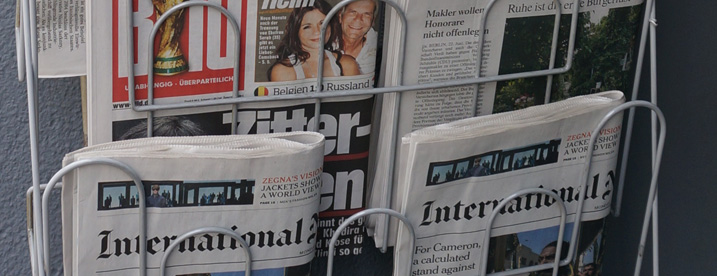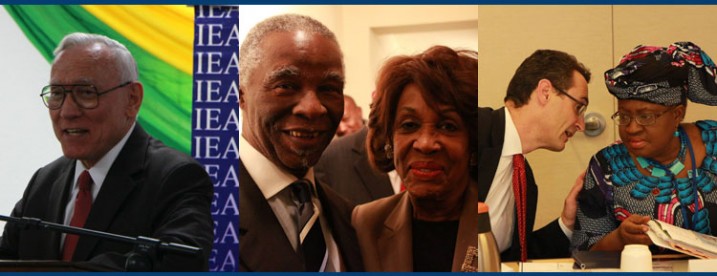By Michele Fletcher, July 18, 2014

More Transparency and Accountability Are Needed, if Tanzania Is to Truly Benefit from its New-Found Gas Reserves
Tanzania’s new-found gas reserves are valued at an estimated $20 billion. Many look at these prospects with optimism, as this revenue may help Tanzania achieve its goal of becoming a middle-income country by 2025. But for others, the situation is more precarious.
Tanzania has been in the same situation when it became a major source of gold not even two decades ago. Today, though Tanzania is still the third largest exporter of gold, there is widespread agreement that the mining sector did not produce the revenue it should have, nor was the effect of the growing industry felt in the population. Tanzania still stands 152nd out of the 182 countries on the Human Development Index, despite having exported billions of dollars worth of gold throughout the past two decades. The value of Tanzania’s mining exports grew to $1.5 billion in 2010, but annual government revenue from its sale was only about $100 million, or about 7%.
By Clark Gascoigne, July 17, 2014

Thomson Reuters Foundation Seeks Applications from African Media for Illicit Finance Training and Assistance Program by July 28th
Are you an ambitious journalist in Africa with an interest in probing illicit finance, money laundering, and tax related abuses? Or, perhaps, you represent an outstanding, independent media organization based in Africa with a desire and reputation for exposing financial crime and corruption?
Either way, the Thomson Reuters Foundation is launching a new three-year program assisting African media on the reporting of illicit finance and tax abuse, and they are hoping that you will apply. According to the TR Foundation:
African economies lose huge sums of money every year through practices such as tax evasion and avoidance, often carried out by large companies. However, this phenomenon receives little attention and is rarely the subject of in-depth investigation.
Thomson Reuters Foundation believes that African media has a vital role to play in bringing this issue to light and exposing tax abuse where it is taking place. We also believe that collaboration between journalists and media organisations across borders is essential when reporting on money flows between countries.
We are seeking outstanding journalists and ambitious, independent media organisations to join us in this new project.
By Michele Fletcher, June 26, 2014

Last week, Namibian activists raised concerns about transfer pricing in Africa’s extractive sector in an open letter to De Beers. Their letter comes at a critical time in which transfer pricing and tax havens have contributed to an exorbitant amount of capital flight from developing countries. Namibia’s economy is hugely dependent on the extractive sector, particularly in diamond exports, which alone account for 10% of GDP. With increased scrutiny into transfer pricing just across the border in South Africa’s platinum mines, these Namibian activists have delivered a timely, earnest demand to investigate transfer pricing in their own country.
Multinational corporations (MNCs), especially those which operate in Africa, are coming under increased scrutiny by governments, media, and the public over their bookkeeping and payments to governments. The extractive sector in particular has been the focus of new regulations on financial transparency: an extremely positive development, but one which has so far missed an opportunity address larger issues concerning abusive transfer pricing and how MNCs of all sorts conduct their fiscal operations.
By Tom Cardamone, May 28, 2014

A Quarterly Newsletter on the Work of Global Financial Integrity from January through May 2014
Global Financial Integrity is pleased to present GFI Engages, a quarterly newsletter created to highlight events at GFI and in the world of illicit financial flows. We look forward to keeping you updated on our research, advocacy, high level engagement, and media presence.
This year has been busy so far, with GFI staff traveling to six continents within the first three months alone. The following items represent just a fraction of what GFI has been up to, so make sure to check our new website for frequent updates.
Measurable Change in India
In late April, the Indian Directorate of Revenue Intelligence released a summary of its first two years of increased law enforcement activity targeted at cases of commercial fraud, including illicit financial flows through trade misinvoicing. Their early results have been remarkable: between March 2012 and March 2014, they detected $1.3 billion worth of commercial fraud, and collected $396 million in new revenue.
India is just beginning its effort to crack down on trade-related illicit financial flows, and should serve as an example of the potential that curtailing trade misinvoicing has for development. India began working in earnest to reduce illicit financial flows after a report by Global Financial Integrity showed the economy had lost $462 billion since 1948 due to illicit outflows. Following years of intense political debate and public outcry, the Indian Ministry of Finance declared trade misinvoicing its ‘top priority’ and began working with GFI and others to address it.

Photos from the launch events for our May 2014 report, “Hiding in Plain Sight: Trade Misinvoicing and the Impact of Revenue Loss in Ghana, Kenya, Mozambique, Tanzania, and Uganda: 2002-2011,” which was funded by the Danish Ministry of Foreign Affairs.
These photos were taken from the launch events in Copenhagen, Denmark, and in Accra, Ghana.
While the precise magnitude and consequences of illicit financial flows in African countries — and throughout the developing world — deserve further analysis, it is clear that such flows are wreaking havoc on the continent. Any sustainable approach to global development has to curtail illicit flows and the mechanisms facilitating them. Only then will we be able to mobilize domestic resources for long-term development.
The Little-Understood Practice of Misinvoicing or Re-Invoicing Relies on Legal Grey Areas and Financial Secrecy and Costs the Continent Dearly
Lately, the media has been replete with stories about how Africa is losing billions of dollars a year through a process called “trade misinvoicing.” The concept of trade misinvoicing is simple: companies and their agents deliberately alter the prices of their exports and imports in order to justify moving money out of, or into, a country illicitly.
The practice is very common in Africa. To name just a couple instances, it has allegedly been used to avoid paying import duties on sugar in Kenya and to shift taxable income out of Zambia and into tax havens abroad.
WASHINGTON, DC – As the world commemorates International Anti-Corruption Day on Monday, December 9, 2013, Global Financial Integrity (GFI)—a Washington-based, non-profit research and advocacy organization—reviewed many of the most notable achievements, developments, and shortcomings in fighting corruption and illicit financial flows for 2013.
“2013 has proven to be a landmark year in terms of policy advancements to curtail corruption and illicit financial flows,” said GFI President Raymond Baker, a longtime authority on financial crime. “Years of hard work by policymakers, researchers, and advocates culminated in real, on-the-ground policy achievements that will directly impact the amount of money leaving developing countries. We saw a few setbacks, but overall the year was very encouraging.”





